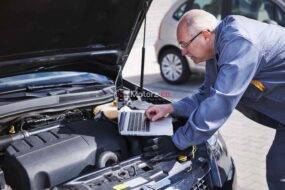AC Not Cooling: Troubleshoot AC problems. Air conditioning is a modern marvel that keeps our homes and workplaces comfortable during the scorching heat. However, there are times when your AC unit may not perform its primary function – cooling. Before you panic and call in the professionals, let’s explore some common reasons why your AC might not be cooling as it should and how you can troubleshoot these issues.
Check the Thermostat:
A simple miscalibration can lead to inadequate cooling. Sometimes, the thermostat may need new batteries, so be sure to replace them if necessary. Clogged air filters restrict airflow, reducing the efficiency of your AC unit. Check and replace the filters regularly, ideally every 1-3 months, depending on usage. Clean filters not only improve cooling but also enhance indoor air quality.
Inspect the Evaporator and Condenser Coils:
Over time, the evaporator and condenser coils can accumulate dirt and dust, hindering the heat exchange process. For the evaporator coil, use a soft brush, and for the condenser coil, use a hose or vacuum cleaner. Low refrigerant levels can significantly impact cooling efficiency. If you notice reduced cooling performance, it might be due to a refrigerant leak. Contact a professional HVAC technician to inspect, repair, and recharge the refrigerant.
Check for Air Duct Leaks:
Leaky air ducts can result in cooled air escaping before it reaches its destination. Inspect your ductwork for any visible leaks and seal them using foil tape or mastic sealant. Properly insulated and sealed ducts ensure that the cool air reaches every corner of your home. Leaky air ducts are like invisible culprits that silently sabotage the cooling efficiency of your air conditioning system.
Examine the Capacitor:
The capacitor is responsible for starting the compressor and fan motors. If it fails, your AC won’t cool effectively. Check for visible signs of damage, such as bulging or leaking. If you suspect a faulty capacitor, it’s best to consult a professional for replacement.
Ensure Proper Ventilation:
Ensure that vents and registers are not blocked by furniture or other objects. Proper airflow is crucial for efficient cooling. Rearrange furniture if needed, and make sure nothing is obstructing the vents. A clogged condensate drain can impede proper moisture removal, leading to excess humidity and reduced cooling. Locate the drain line and clean it using a mixture of bleach and water. This prevents algae and mold growth.
Inspect the Fan:
The fan in your AC unit plays a crucial role in distributing cool air. If the fan is malfunctioning, it can lead to insufficient cooling. Check for any visible damage or loose blades. If the problem persists, seek professional assistance. Examine the electrical components, such as fuses and circuit breakers, to ensure they are functioning correctly. Tripped breakers or blown fuses can disrupt the power supply to your AC unit, causing cooling problems.
Consider the Size of Your AC Unit:
An improperly sized AC unit may struggle to cool your space effectively. Consult with an HVAC professional to determine if your unit is the right size for your Air Conditioning Your Home or if an upgrade is necessary. Preventive maintenance is key to ensuring your AC functions optimally. Schedule annual professional inspections to identify and address potential issues before they impact cooling performance.
Conclusion:
When your AC Not Cooling as it should, a systematic approach to troubleshooting can often pinpoint the problem. From simple tasks like changing air filters to more complex issues like refrigerant leaks, addressing these issues promptly can save you from discomfort and potentially expensive repairs. If in doubt, always consult with a qualified HVAC professional to ensure your cooling system is in top-notch condition.





